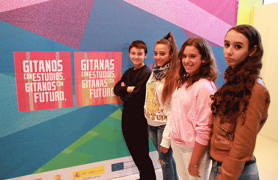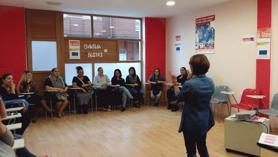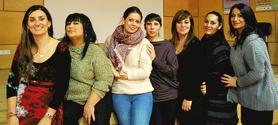Our work on gender equality[editar]
From the FSG we promote and support equality for Roma women in all the aspects of their lives. Therefore, our work for gender equality in favor of Roma women is largely related with the work we are doing in the fields of education, employment, health, housing, support for victims of discrimination…
There can´t be a real social inclusion for Roma population if Roma women is not part of it. We are aware that for the educational advancement of Roma women, overcoming the barrier of secondary education to post-compulsory levels is one of the key challenges, both for the Roma and for the society as a whole. Through our Promociona programme we work to raise the educational levels of Roma youth within the compulsory levels.
Besides this school support programme, FSG supports Roma students economically through scholarships. From primary school to post graduate levels, the objective is to support to Roma (with emphasis on women) who cannot afford it. Through the scholarship programme "Luis Sáez" which started for the course 2016/17, several Roma women have the opportunity to complement their education with post-graduate training.
In the same way, in the FSG we are convinced that employment is the gateway to social inclusion. Therefore, many efforts focus on promoting labor market inclusion of Roma women through our Acceder Programme, where 52% of participants are women.
Apart from our work for the labour inclusion of Roma women, we also develop other programmes covering the different profiles and needs of the Roma women from a comprehensive approach, bringing equality to the lives of Roma women.

FSG supports Roma women from an integral approach
CALÍ. Equality for Roma women
Promotion of Equal Opportunities and social integration of Roma Women and attention to multiple discrimination.
The CALÍ programme works in 28 cities across Spain with a low employability profile of Roma women. Its three main objectives are to promote equal opportunities for social inclusion and access to the labor market through personalised social and labor itineraries; to promote gender equality between women and men, breaking cultural barriers, incorporating conciliation issues, and raising awareness on gender violence, supporting victims; and to promote equal treatment, combating all forms of discrimination.
CALI is a programme that seeks to empower Roma women, to guarantee the exercise and defense of their rights. A programme that seeks ultimately full citizenship.
CALI is an innovative programme in almost all its aspects. One of the main innovations is its holistic approach, addressing the needs of Roma women from a multidimensional perspective (personal, social, labour) aiming to promote equality (equal opportunities, gender equality and equal treatment).
It is innovative because of the profile of the Roma women participants: Roma women mostly, with an extremely vulnerable profile and highly disadvantaged socio-labour conditions. It is designed to have a strong impact and promote social change within the Roma community: it has a medium-term perspective, until 2019. The project is funded, among others, by the European Social Fund. It has a strong regional presence and it gives the opportunity to hire 30 professional women, 25 of whom are Roma.
The programme works directly with Roma women (is expected to reach more than 2,400 women until 2019), but not only with them. Achieving equality requires incorporating, on the one hand, the Roma men and the Roma community as a whole, raising awareness on issues of gender equality and conciliation; but also it requires adding allies out of the Roma community. For this purpose, the programme plans to work closely with public authorities, social services, employment services, gender institutions and assistance to victims of domestic violence, prosecution of hate crimes and discrimination, as well as other agents or specialized entities.
The CALI programme, consists on individual and group activities with Roma women. Training, awareness and advocacy activities aiming to get a social impact and contribute in the change of the social image of the Roma community.
CALI is a new FSG programme developed under the Operational Programme of Social Inclusion and Social Economy. This programme complement others dedicated to vocational training and employment (Acceder programme, since 2000) and promoting school success of Roma students (Promociona programme since 2009).
Sara Romí programme
Sara Romí is a motivation and support programme for Roma women aiming to promote social and labor integration.
The overall objective of SARA Romí programme is to improve the living conditions and the incorporation into the socio-labor activity of Roma women promoting personal and economic empowerment. Conducting personal and professional itineraries and incorporation of ICT skills to give them for greater skills for the participation in the social and the working field.
The profile of participants correspond to Roma women with special needs (low training levels, lack of labor skills, psychosocial and gender discriminatory factors), which can lead them to situations of social and labor exclusion.
Each action will include, for each of the women involved, conducting a personal itinerary developed over three successive phases: personal motivation, motivation phase for employment and training phase linked to improving employability with guidance to job search.
This personalized itinerary will take place through a group work (A) and an individual work (B). The development of the itineraries will last for 6 months. Each of the phases will be adapted in each location to the starting point of participating women, as well as the market opportunities that exist in the territory, so that the itineraries will be flexible and variables depending on the needs of the participants.
The 10 locations where the programme is implemented are selected according to the following criteria justifying the appropriateness of implementing the Sara Romí programme:
- Particularly vulnerable, socially disadvantaged and / or lack of basic skills of participating women, who may be covered from the programme's actions;
- Expectation of commitment to continued active participation by potential participants in the itineraries and all programme activities and high motivation to employment;
- Existence of a close relationship and coordination with municipal social services with the device for referral and follow-up of the participating women, their participation may be one consideration for the social wage paid;
- Close coordination between this programme and other programmes of the organization, mainly the employment programme Access, which will allow the continuity of the itinerary of employment of women once participants have completed the programme Sara Romí 16-17;
- Territorial distribution across regions and autonomous communities;
- In addition, all the FSG´s offices are implementing actions to support the inclusion of the Roma community from an integrated approach.
It is expected to reach with these activities to a minimum of 150 Roma women aged between 17 and 55 years by the end of 2017.

Sara Romí programme session
Other actions for the Equality of the Roma women
Other actions for the Equality of the Roma women:
- Promotion of equality and opportunity of the Roma women With the Roma Women Group (RWG).
- Social Awareness
Roma Women Group (RWG)
It is necessary to get up-to-date knowledge on the progress, on the internal and external barriers and the real situation of the Roma women in our country. To do so, we support the Roma Women group. It is a participating group mainly composed by Roma women, essentially professionals from the FSG who are divided into different localities to develop strategies responding to the needs and interests of the Roma women in order to promote the gender equality.
On the other hand, the group´s objective is the assimilation of the gender perceptive in a transversal approach and create space for reflection on the multiple discrimination that Roma women face.
The RWG is currently focusing on the FSG paper relating to the promotion of the gender equality for the Roma women and their current situation. With a special intention on the youth and the use of new technologies, the diversity among the Roma women and the internal and external barriers they are facing.
Social Awareness
- Through various days of celebration such as the 8th of March "International Women's Day", and the 25th of November “the International Day for the Elimination of Violence against Women” as well as other actions to raise awareness on the situation and image of the Roma women. The different actions go from the dissemination of leaflets, the creation of audiovisual material, and the participation to seminars at national and international level.
- “Roma and woman” leaflet. “They called me Roma and they forgot to call me woman. All women, all Roma” it is the title of the leaflet and brochure that we have edited as an awareness-raising action on the Roma women's image and situation in order to show their diversity and question some stereotypes which affect them.
- We also bring the current perspective and needs of the Roma women to the diverse platforms for the promotion equality of opportunity for vulnerable groups: group for inclusion and equality of the State Council for the Roma population, group for equality of gender of the State Council of NGO, group of work on equality of the Third Sector Platform.
- Campaigns with social key actors such as Facebook: The campaign "Be able to Be"denounces the invisibility of the Roma women in the society and the social image always linked to stereotypes. More info: https://www.gitanos.org/actualidad/archivo/124539.html.en
- Telarañas a campaign to support Equality for Roma women. Fundación Secretariado Gitano together with the Roma artists Soleá Morente and Marina Carmona launch the movement #GitanasEnEstéreo. A song with a videoclip and a fundraising campaign addressing the society at whole. More info: https://www.gitanos.org/actualidad/archivo/124687.html.en


- To be able to be Facebook and FSG campaing on the social image of the Roma women








